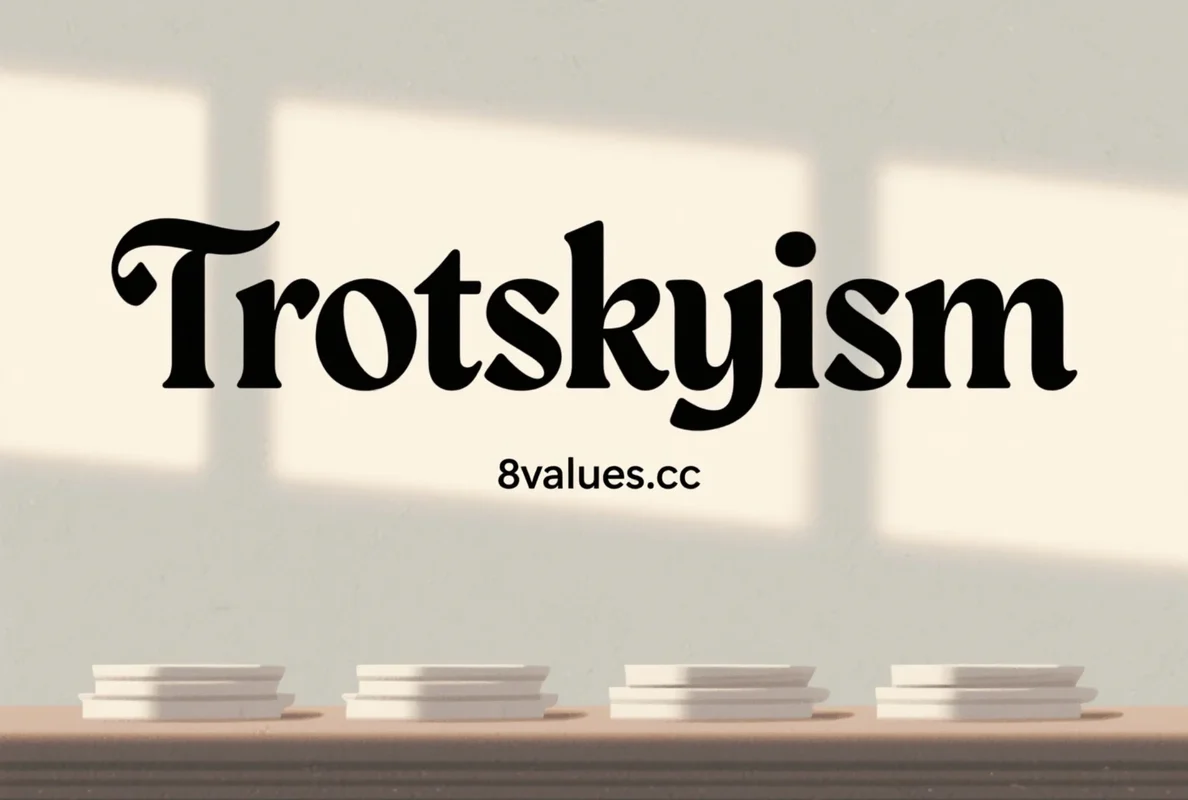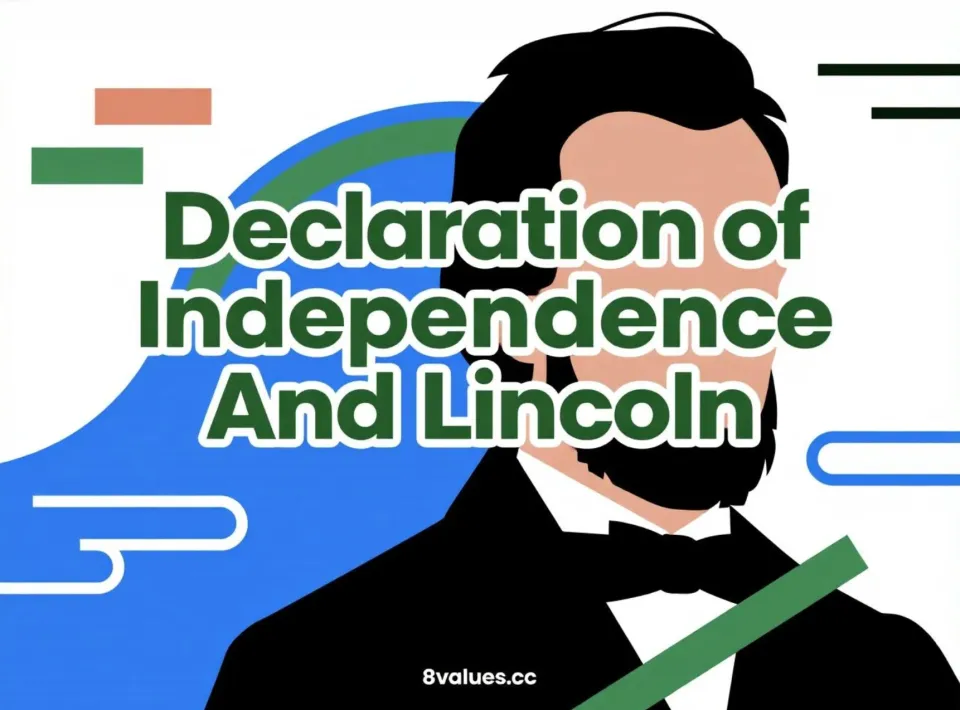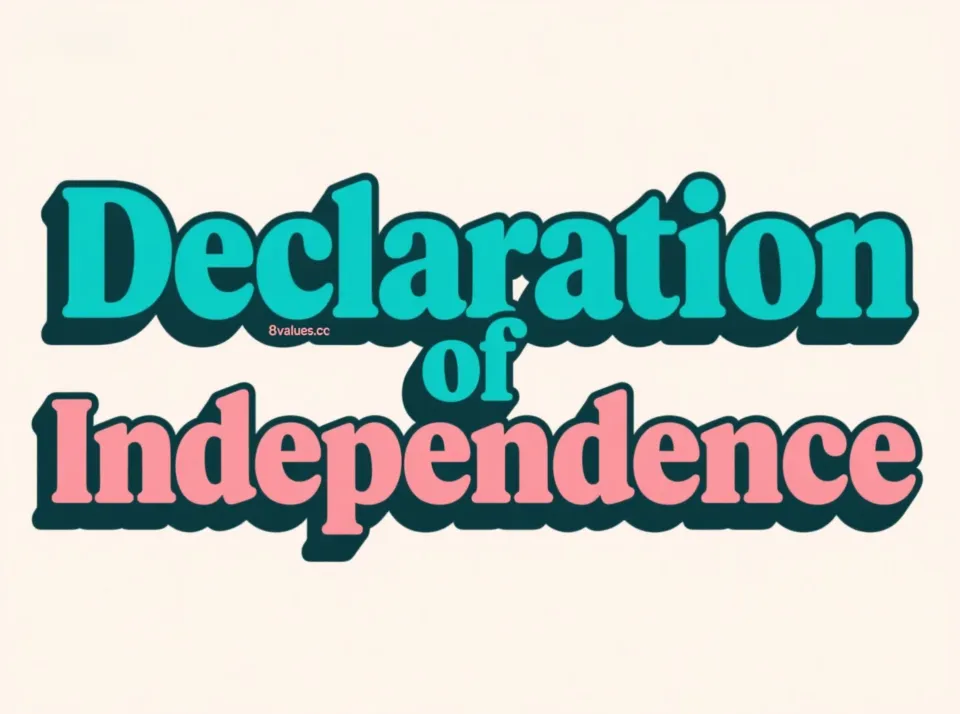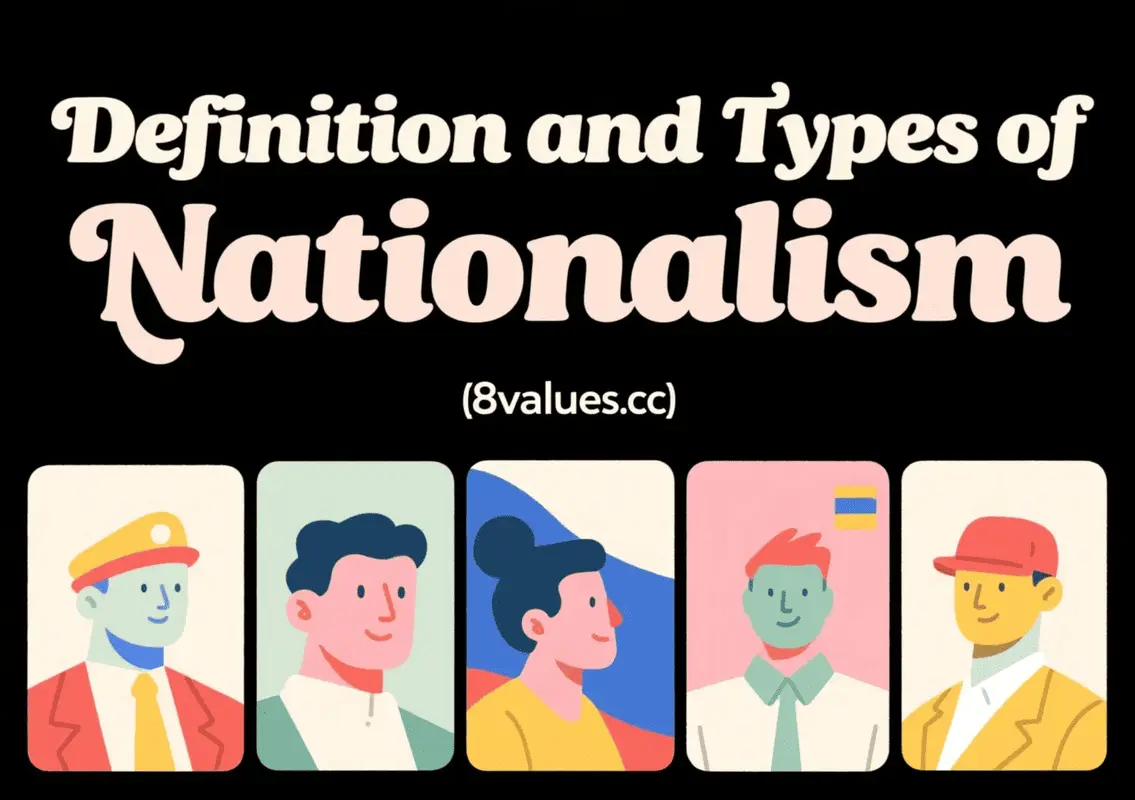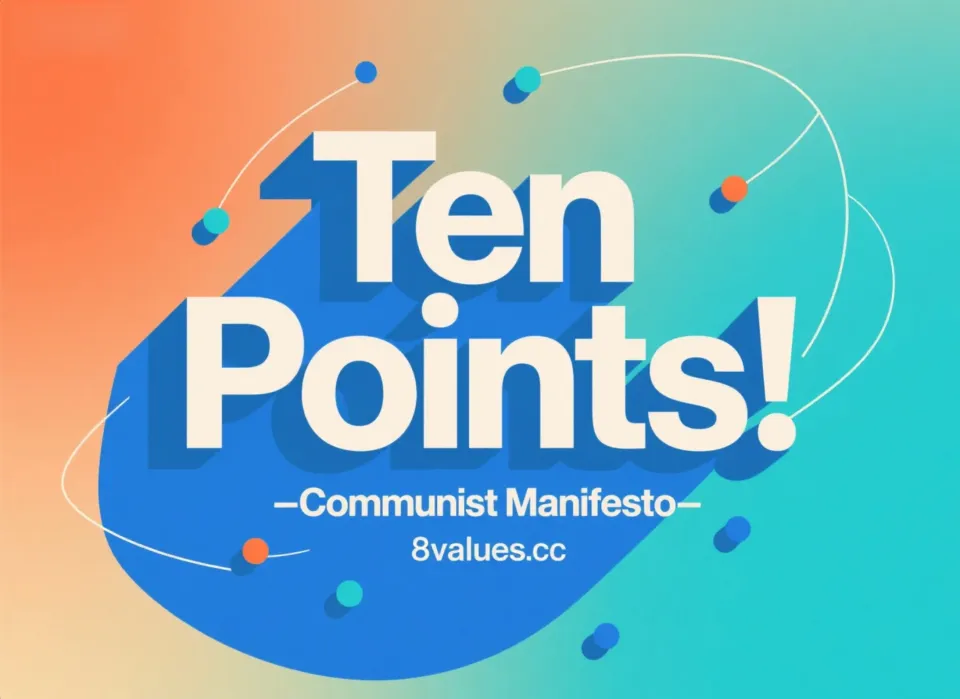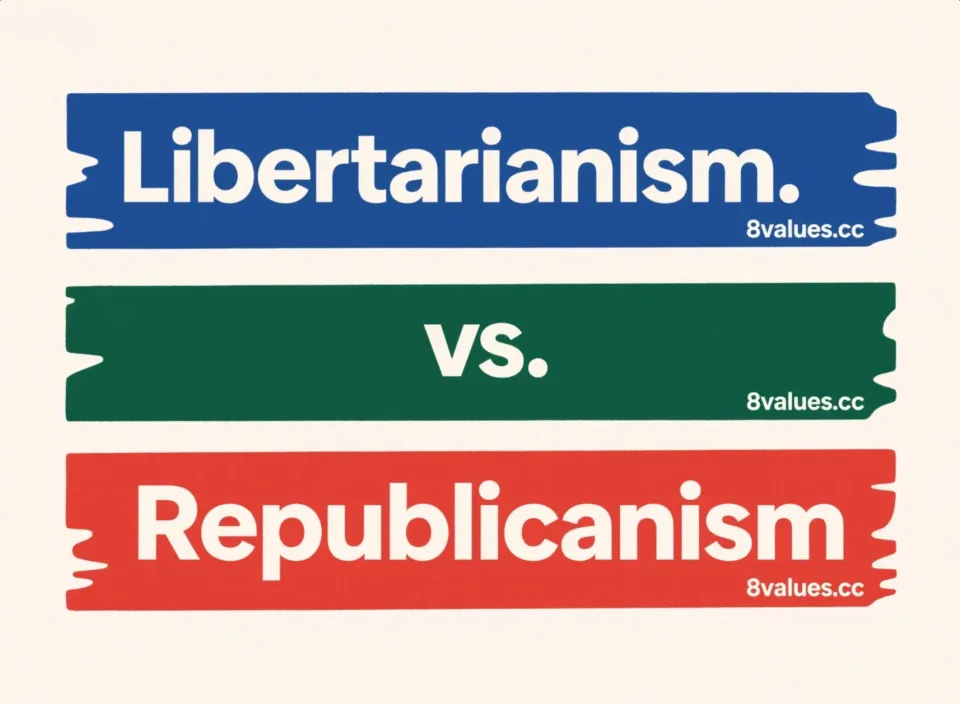Trotskyism | 8values Interpretation of ideological ideology in political tests
Explore Trotskyism, a Marxist political ideology originating from Lev Trotsky. This article will introduce its core theory, its conflict with Stalinism, its contribution to the Russian revolution and its global impact, helping you to have a clearer understanding of this complex ideological system in the 8 values political test.
In the vast history of political thought, Leon Trotsky is undoubtedly an influential theorist and revolutionary. He devoted his life to building a utopian society based on Marxism, even though this dream eventually collapsed around him. With the "continuous revolution theory" as the core, he put forward a series of unique political, economic and cultural views, forming a theoretical system called "Trotskyism". This ideology is not only an evolution of Marxism and Leninism , but also represents a sharp criticism of the Soviet bureaucracy and anti-democratic thought under the leadership of Joseph Stalin . On the 8values Ideological page , Trotskyism is often seen as the left wing in the communist spectrum, although it differs from left wing communism.
Trotsky's Life and Revolutionary History
Lev Davidovich Bronstein, the historical Lev Trotsky, was born on November 7, 1879 in a wealthy Jewish farmer's home in the village of Yanovka, Ukraine. He has demonstrated the ability to think independently since he was a child and dared to challenge social order. He was exiled to Siberia many times, but he successfully escaped from prison every time.
In 1903, Trotsky married Natalia Sedova and had two sons. While in Paris, he met Natalia. He had participated in the Second Congress of the Russian Social Democratic Labor Party in London and witnessed the division between the Bolsheviks (majority) and the Mensheviks (minority). At first, he worked to bridge the differences between the two factions.
During a massive demonstration following the 1905 Russian-Japanese War, Trotsky organized the first Soviet in St. Petersburg and served as president. During World War I, he was expelled by France and Spain for anti-war rhetoric. After the overthrow of the Russian Tsar Nicholas II in 1917, he returned to Russia and arrived in St. Petersburg in May of the same year. He quickly became a popular orator and joined the Bolsheviks a few months later. After the Bolsheviks took power, Lenin served as the supreme leader and Trotsky became the second. He was considered the "brain" and outstanding strategist of the October Revolution, playing a decisive role in the Petrograd uprising.
Trotsky formed and led the Red Army during the Russian Civil War (1918-1921), and achieved remarkable victory. Lenin regarded him as a "important role" in the Bolshevik leadership and pointed out that he should be placed in "a important position" while Stalin should be "significantly demoted (or even removed from office).
The core idea of Trotskyism: Theory of Continuous Revolution
The core of Trotskyism is Permanent Revolution , which is his unique contribution to Marxist theory. This theory was elaborated in the 1908 "Results and Forecasts", and its core point is:
- The weakness of the bourgeoisie : Trotsky believed that in backward countries, the bourgeoisie could not assume the task of a thorough democratic revolution, so the proletariat must take over the task of political democracy and the redistribution of land and wealth.
- Permanence of class struggle : He argues that class struggle must continue until communism is finally realized.
- Globality of Revolution : Trotsky believes that only when revolutions around the world succeed can communism be truly realized, otherwise the revolution will not last. He stressed that after the victory of the proletarian revolution in a backward country, if the proletariat does not receive direct assistance from the proletariat in advanced capitalist countries, it will not be able to maintain the regime and move towards socialism.
- Oppose the "two-stage theory" : Continuous revolutionary theory opposes the view that the bourgeois revolution and the socialist revolution are divided into two independent stages, and a capitalist society needs to be fully developed in the middle. He believes that democratic revolution can directly lead to the dictatorship of the proletariat, thus putting the task of socialism on the agenda.
For example, during the Chinese Revolution in the 1920s, Trotsky believed that only the proletariat (as leaders of the peasant masses) could completely solve the task of national and democratic liberation. Lenin's "April Outline" was once accused of "Trotskyism" for proposing that the Russian proletariat might seize power before the Western proletariat and take socialist measures.
Oppose "One country builds socialism": the persistence of internationalism
One of the most fundamental differences between Trotskyism and Stalinism lies in its opposition to the theory of "one country builds socialism" . Stalin believed that socialism could be built independently in the Soviet Union, while Trotsky firmly believed that it was impossible for a country to build socialism without the support of the international proletarian revolution.
- The necessity of internationalism : Trotsky stressed that the Russian revolution is only one link in the world's revolutionary chain. He believes that if the European proletariat cannot seize power in the short term, Russia will face the danger of capitalist restoration.
- Deficiencies in the economic foundation : Trotsky pointed out that Russia lacks the productive foundation for building socialism. Without the assistance of state-of-the-art capitalist countries, backward countries such as China will not be able to "surpass the stage of capitalist development" through their own strength.
- Criticism of the New Economic Policy (NEP) : Trotsky strongly opposed the market-oriented new economic policy introduced by Lenin in 1921, believing that it deviated from the state's complete control of the economy and advocated the establishment of a model command economy.
Criticism of Stalinism and the theory of "Degenerate Workers' State"
After Lenin's death, Stalin launched a cruel suppression of Trotsky, which became a key link in the development trajectory of Trotskyism. Stalin accused Trotsky of creating division within the party and labeled Trotsky's 1923 writings as "anti-Leninist". Trotsky then lost all important positions and was expelled from the party in 1927, exiled to Kazakhstan, and exiled from the Soviet Union the following year for Türkiye.
- Struggle in Exile : Even in exile, Trotsky never gave up his criticism of Stalinism. He wrote books such as The Revolution Betrayed and Hitler and Stalin, exposing Stalin's bureaucratic autocracy and political betrayal. These works are published in newspapers around the world.
- Assassination : Stalin regarded Trotsky as the "incarnation of evil" and the scapegoat for all issues in the Soviet Union, and even accused him of conspiring with Hitler. On August 20, 1940, Stalin's agent Ramón Mercader assassinated Trotsky with an ice axe in Mexico City. The next day, Trotsky passed away.
- Degenerated Workers' State : Trotsky described the Soviet Union under Stalin as a "fallen workers' state." He believes that bureaucracy has hindered the transition to socialism in order to safeguard its own privileges. Therefore, Trotsky advocated a "political revolution" rather than a "social revolution" in the Soviet Union, overthrowing the Stalinian government, but retaining the nationalized production relations because he believed that the ownership of the state means of production was an embodiment of the "proletarian state basis".
Stalin defined Trotskyism as: denying the possibility of building socialism in the Soviet Union, denying the inclusion of peasants in socialist construction, denying the iron discipline within the party, and recognizing the freedom of factions within the party. Some historians even believe that Trotsky and Stalin had similar totalitarian ideas.
Trotskyism's strategy and practice
Trotskyism is not just a set of theories, it also contains a series of specific political strategies and practical propositions. In the political spectrum coordinates of the 8 values political test , these practical tendencies are usually on the left.
- Vanguard Party : Trotskyism retained Lenin's Vanguard theory. He believes that the people of non-industrialized countries cannot lead the revolution alone and therefore need a vanguard of working class and educated Marxists to prevent capitalist populist parties from coming to power. However, some critics argue that Trotskyism distorted Lenin’s vanguard theory in emphasizing “intra-party democracy” and “partisan freedom”, which could lead to intra-party division.
- United Front Strategy : Trotsky was a key figure in the early days of the Communist International (the first four congresses), helping to promote the Bolshevik strategy and strategy across Europe. He argued that the united front was a strategy for uniting revolutionaries and reformists to fight together, while also striving for workers to turn to revolution. After his exile, he continued to advocate for the establishment of an anti-fascist united front in Germany and Spain. Lenin also supported the united front strategy and believed that "all opportunities should be used to win allies of the masses."
- Economic Development Outlook : Trotsky advocates rapid industrialization and voluntary collectivization of agriculture. He opposed Stalin's concept of industrialization that prioritized the development of heavy industry, advocated using foreign trade to accelerate investment and guide investment through a comparison coefficient system. He also supports the imposition of progressive taxes on wealthy farmers (rich farmers and merchants under the New Economic Policy) to fund industrialization and agricultural cooperatives.
- Culture and Science Attitude : In Literature and Revolution, Trotsky explores the relationship between art and the Russian Revolution, defends the autonomy of intellectuals, and supports Freudian psychoanalytic theory and Einstein's theory of relativity. He believes that cultural development will promote industrial and technological progress, and regards proletarian culture as "temporary and transitional" and lays the foundation for the establishment of a superclass culture. He also supports Taylorism and Lenin for scientific management of the industry.
Controversy and Criticism of History
As a political ideology, Trotskyism also faces widespread controversy and criticism in its historical process.
- Differences from the Bolsheviks and Mensheviks : Trotsky initially tried to bridge the differences between the Bolsheviks and Mensheviks. His position in the 1905 revolution was similar to that of the Bolsheviks, but fundamentally different from the Mensheviks. Although he later joined the Bolsheviks, he had differences with Lenin on the issue of party organization.
- Assessment of the role of peasants : Trotsky's theory of continuous revolution has been criticized for underestimating the revolutionary nature of peasants and denying the possibility of a worker-peasant alliance. He believes that farmers lack political awareness and is just a force that needs to be led, not a subject that creates history. Stalin, on the other hand, expanded the revolutionary foundation by uniting workers, poor peasants and oppressed nations.
- Criticism from other socialist schools :
- "Proletarian Television" : Criticism of Trotskyism for attracting privileged classes, disagreeing with words and deeds, neglecting peasants, and "schadenfreshing" when socialist countries encounter counter-revolution.
- Marxist-Leninist : Moissaye J. Olgin believes that Trotskyism is the "enemy of the working class" and a "subversive force" that eventually evolves into a "counter-revolutionary conspiracy." Fidel Castro also called Trotskyism a "false position" and later became a "vulgar tool for imperialism and reactionaries."
- Left-wing communists : Some believe that the October Revolution was totalitarian from the beginning, so there is no fundamental difference between Trotskyism and Stalinism in practice and theory.
- Imperialist instrumentalism : Some critics, such as Harpal Brar, believe that Trotskyism is a “tool of imperialism”, plays a separatist role in the workers’ movement and prevents the working class from making meaningful contributions to socialism. They even claimed that the Trotskyists repackaged the lies of imperialism as "Leninism."
The legacy of Trotskyism and contemporary influence
Despite the controversy, Trotskyism, as a unique political ideology, has had a profound impact on a global scale, and some organizations and movements have inherited their ideas to this day.
- Fourth International : In 1938, Trotsky and his followers established the Fourth International, aiming to promote the global proletarian revolution and oppose Stalinism. The Death Agony of Capitalism and the Tasks of the Fourth International, the programmatic document of the Fourth International, is considered to be the most comprehensive and refined summary of Trotskyism.
- Global Trotsky ’s theory of revolution has had decades of influence on communist thinkers in Africa, the Caribbean and Latin America. Modern Trotskyist organizations are active in many countries, such as Argentina (FITU), France, Germany, Greece, the United Kingdom, the United States, Portugal, Turkey, Sri Lanka, Canada, Mexico, Pakistan, Brazil, etc. In the United States, for example, despite the marginal position of the Trotskyist movement, it still burst out with a certain amount of political energy periodically, attracting attention.
- Impact on other left-wing movements : Trotskyism is regarded by many as an "acceptable communist face" and represents another possibility for the Soviet Union that was not corrupted by Stalin.
- Theoretical legacy : Before Trotsky's death, he adhered to his revolutionary ideals and was full of great optimism about the future of human socialism. His works are regarded as the treasure house of Marxist theory for a new generation of revolutionaries. The theoretical and historical analysis he proposed remains practical for today's social and political challenges.
Conclusion
Trotskyism is an important trend in the political thought of the twentieth century, shaped by Lev Trotsky's unique theory and his key role in the Russian Revolution. His core propositions such as the theory of continuous revolution and the criticism of Stalin's theory of "one country builds socialism" left a deep impression in the international communist movement.
Although Trotskyism has experienced many divisions and severe criticism from different political factions in history, the proletarian internationalism, worker democracy and resistance to bureaucratic autocracy it advocates are still of practical significance today. Through a comprehensive understanding of Trotskyism, we can better understand its complex historical background and theoretical depth. If you are interested in your political inclinations, you might as well try the 8values political test to explore the positioning of Trotskyism in a modern context.
To learn more about ideological and political stances, visit the official 8values blog and ideological list for more exciting content.
